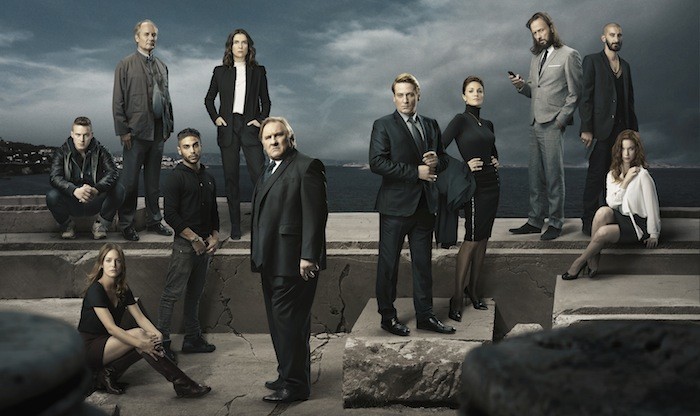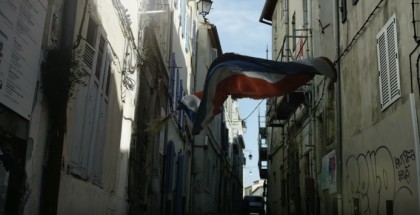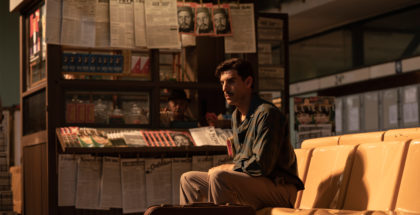Netflix UK TV review: Marseille (Season 1, Episodes 1 to 4)
Review Overview
Cast
7Style
7Script
3David Farnor | On 07, May 2016
Netflix unveiled its latest original series this week: a political drama about betrayal, power and corruption. No, not House of Cards, but Marseille – or House of Cards, but French. How can you tell it’s French? Firstly, the locations. Secondly, the subtitles. But most of all? The occasional whiff of fromage.
The show stars Gerard Depardieu as Robert Taro, the incumbent mayor of the titular town. He’s preparing to bow out and leave behind his successor, Lucas Barres (Benoit Magimel), along with a legacy – a casino and hotel complex built on the old port designed to bring in the big spenders, and put an end to the Mafia-run slot machines dotted across the metropolis. Just as approval for the project goes to vote, though, Lucas stabs Taro in the political back and blocks the whole development – leaving Taro clambering to get back in the race for his job and save his city from the mob, not to mention his Machiavellian prodigy.
It’s not a bad premise, by any rate, with the table laid for a veritable buffet of different shades of grey – it’s spelled out to us immediately that Taro is no hero, with an absurdly arty opening shot that sees him snort cocaine before declaring how much he loves his city. That, however, also sets the tone for the rest of the show – lots of style, but little substance.
The style, let’s be clear, is top-notch, from the gorgeous, winding title sequence (accompanied by a theme from Alexandre Desplat) to some striking aerial cutaways that see Marseille careen and tilt under the shifting political horizon. Directors Florent Siri and Thomas Gilou go all out, from guns and meaningful glances to car chases and meaningful glances, as well as frequent sex scenes and did we mention the meaningful glances?
The problem is the script – the show looks the part every step of the way (if you like your TV with a serving of cliched sex scenes), but as soon as anyone opens their mouth, the classy mood is replaced by something mediocre at best and laughable at worst. Barres, who is meant to be a mysterious villain with enigmatic motives, mostly just comes across as angry – why go to such lengths to betray Robert, you wonder, when he could have just not pushed for the casino deal to begin with and waited for his time to inherit the top job? Magimel is good at slithering between women, glaring from behind his pristine glasses, before chatting up Taro’s wife and daughter. But every now and then, he has to stop and says dramatic things, such as “The son must murder the father”, so Netflix has something catchy to put in the trailer. The suggestion that he might not have revealed all of his back-story, meanwhile, only makes him less convincing.
Taro’s wife is equally ill-conceived, treading water between loyalty and possible infidelity, before being subjected to a medical subplot that feels so trivial it turns an entire cliffhanger into a dull anti-climax – one that relies upon unrealistic doctoring practices and, more importantly, fails to elicit any sympathy whatsoever. The relationship between his daughter and a goon from the wrong side of the tracks, meanwhile – “What does your dad do?” “He’s a driving instructor” – seems like it’s there just to tick another box on the spreadsheet.
The House of Cards comparison is, of course, unfair – Marseille is nothing like the US thriller, with no Frank Underwood-style asides to keep us hooked and a more honourable protagonist to root for. But in the streaming age, the contrast highlights just how varied the output from the VOD giant can be. Between All 4’s Walter Presents and BBC Four, we now have better access to continental TV than ever – and next to Mafiosa and Spin (which Marseille’s Dan Franck also created), this is clearly not the best France has to offer. Is it Netflix’s overarching influence that’s the problem, dumbing down the French content to win as wide an international audience as possible? Perhaps – the over-stylised use of music alone seems designed to drown out the dialogue. (Unfortunately, it doesn’t succeed.)
The cast are good, particularly Depardieu, who shambles through the corridors of power with a weary, old-fashioned air. But it’s hard to believe any of it – the glossy sheen only reinforces the artificiality of the whole affair. Scenes where he blackmails rivals, while looking out over the coast, should be gripping, but carry no weight. More soap opera than serious drama, this is the kind of show where metaphors are taken literally and exposition is disappointingly spelled out. There’s still potential in the ensemble of characters from all walks of life to drum up some tension in the series’ second half, but compared to Sweden’s Blue Eyes, which feels edgy and contemporary in its tackling of nationalism, there’s little subtlety to found in these streets. Cheese lingers on every corner. Il n’y a pas de nuance.
Marseille: Season 1 is available on Netflix UK, as part of an £9.99 monthly subscription.




















